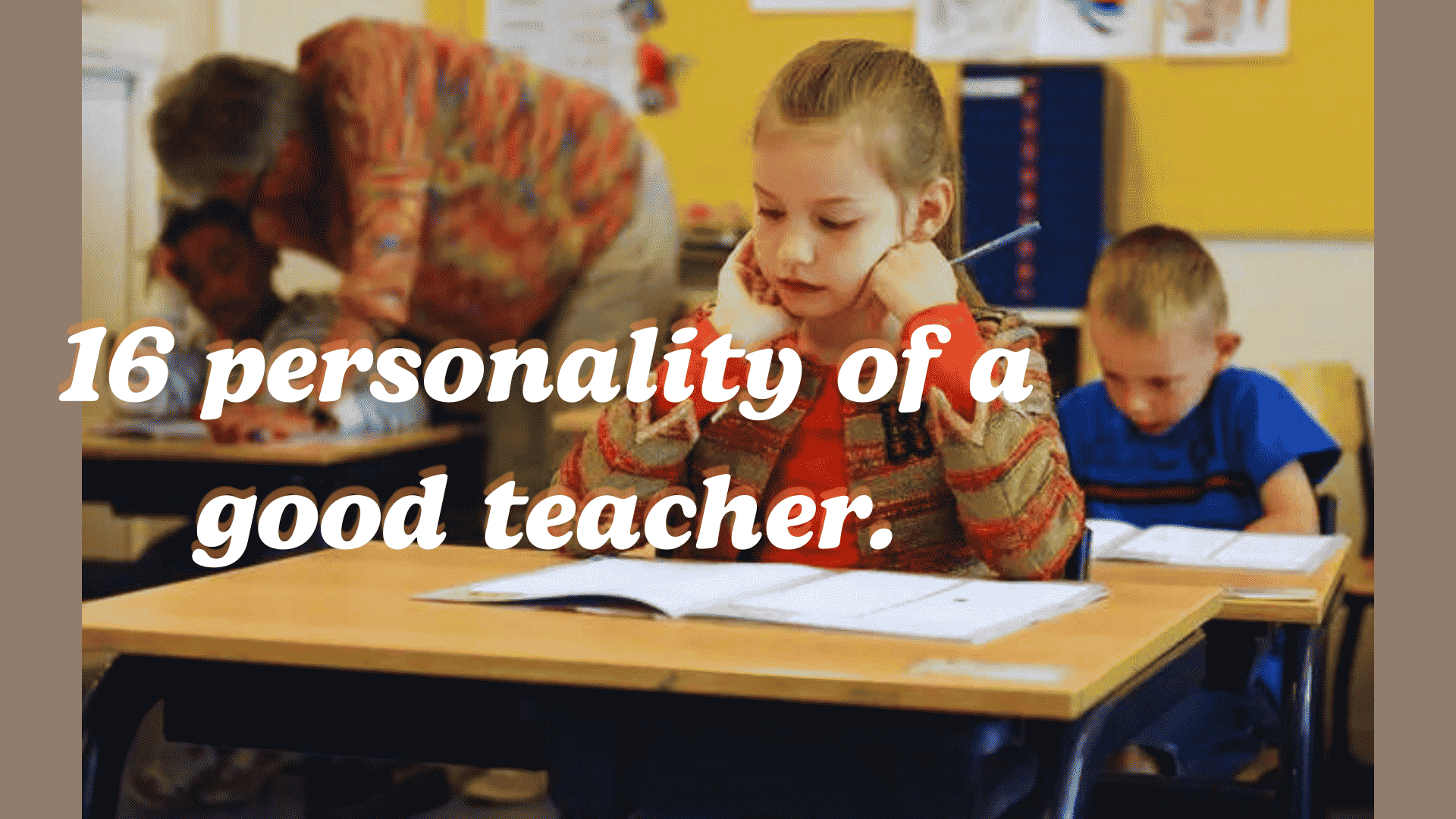Hello friends, welcome to (international stories) in this story we will discuss the teaching profession. 16 personality of a good teacher. What qualities of any good teacher and his profession? what makes a good teacher? Complete read this story maybe you will like, What makes a good teacher? Qualities of a good teacher.

16 personality of a good teacher.
A good teacher possesses a variety of qualities and characteristics that contribute to their effectiveness in the classroom. While there is no single “personality” that defines a good teacher, here are 16 key traits and qualities commonly associated with effective educators:
- Passion: Good teachers are passionate about their subject matter and teaching itself, which helps inspire and engage students.
- Patience: They have the patience to work with students at their own pace and to handle challenging behavior.
- Empathy: They understand their students’ needs and can relate to their struggles and concerns.
- Communication Skills: Effective teachers are clear and articulate in their communication, both in speaking and writing.
- Adaptability: They can adjust their teaching methods to meet the diverse needs of their students.
- Organizational Skills: Good teachers are well-organized, which helps them manage their time and classroom effectively.
- Creativity: They are creative in their approach to teaching, making lessons interesting and engaging.
- Enthusiasm: They convey enthusiasm for learning and maintain a positive classroom atmosphere.
- Flexibility: Effective teachers are adaptable to changing circumstances and open to new ideas.
- Leadership: They lead by example, setting high standards and expectations for their students.
- Problem-Solving Skills: Good teachers can analyze challenges in the classroom and develop strategies to address them.
- Respect: They treat all students with respect and expect the same in return.
- Supportiveness: Effective teachers provide support and encouragement to help students succeed.
- Knowledge: They have a strong understanding of their subject matter and the ability to convey that knowledge to students.
- Humor: A sense of humor can make learning enjoyable and help create a positive classroom environment.
- Dedication: Good teachers are committed to their students’ success and continuously work to improve their teaching skills.
Remember that every teacher is unique, and the combination and degree of these qualities may vary. Effective teaching often involves a blend of these traits, tailored to the specific needs of the students and the subject matter being taught.
What makes a good teacher?
A good teacher possesses a combination of qualities, skills, and attitudes that contribute to effective teaching and create a positive learning environment. Here are some key attributes that make a good teacher:
- Knowledge and expertise: A good teacher has a deep understanding of the subject matter they are teaching. They are well-versed in the content and can explain it clearly to students.
- Communication skills: Effective communication is essential. Good teachers can convey complex ideas in a way that students can understand. They listen actively, ask questions, and provide constructive feedback.
- Passion and enthusiasm: A genuine passion for the subject matter and teaching itself can inspire students. Enthusiastic teachers often ignite curiosity and motivation in their students.
- Patience: Teaching can be challenging, and students learn at different paces. Good teachers are patient and understanding, providing support and encouragement to all students.
- Adaptability: The ability to adapt teaching methods to the needs of individual students and changing circumstances is crucial. A good teacher can modify their approach to accommodate diverse learning styles.
- Empathy and compassion: Understanding the challenges and emotions students face is important. Empathetic teachers create a safe and supportive learning environment.
- Classroom management: Effective classroom management skills help maintain a productive and respectful atmosphere. This includes setting clear expectations and addressing behavioral issues appropriately.
- Organizational skills: Good teachers are organized in their lesson planning, grading, and administrative tasks. This ensures that the learning experience is well-structured.
- Creativity: Incorporating creative and engaging teaching methods, such as interactive activities and multimedia, can make learning more enjoyable and effective.
- Dedication to continuous learning: The best teachers are lifelong learners themselves. They stay updated with new teaching methods, technologies, and educational research to improve their practice.
- Respect for diversity: Teachers should respect and celebrate the diversity of their students, including their backgrounds, cultures, and abilities. This fosters inclusivity and equal opportunities for all learners.
- Motivational skills: Inspiring students to set and achieve goals is a key attribute of a good teacher. They help students see the value and relevance of what they’re learning.
- Evaluation and feedback: Good teachers regularly assess student progress and provide constructive feedback. This helps students understand their strengths and areas for improvement.
- Problem-solving skills: Teachers encounter various challenges, and the ability to adapt and find solutions is essential for maintaining a positive learning environment.
- Professionalism: Being punctual, maintaining a professional demeanor, and collaborating with colleagues and parents are important aspects of being a good teacher.
- Flexibility: Adapting to changes in curriculum, technology, and educational policies is crucial for staying effective in the teaching profession.
- Mentorship: Good teachers often serve as mentors to their students, providing guidance and support beyond the classroom.
- Dedication to student success: Ultimately, a good teacher is committed to the success and well-being of their students, doing whatever it takes to help them achieve their potential.
 While these attributes contribute to what makes a good teacher, it’s important to note that teaching is a complex and dynamic profession, and the best teachers continually evolve and refine their skills to meet the changing needs of their students and the educational landscape.
While these attributes contribute to what makes a good teacher, it’s important to note that teaching is a complex and dynamic profession, and the best teachers continually evolve and refine their skills to meet the changing needs of their students and the educational landscape.
At a wedding ceremony, a man goes to a man he knows and asks. Do you recognize me? He looked carefully and said “Yes you are my primary school student.
What are you doing nowadays?
The student replied, “I am a school teacher like you. And this desire to become a teacher was born in me because of you. The teacher asked, “How is that? The student replied, “You remember once a gorgeous watch of a boy in the class was stolen and In fact, I stole its watch. You told the whole class that whoever stole this watch should return his.
I wanted to return the watch but could not bear the clock due to embarrassment. You ordered the whole class to stand facing the wall, close their eyes and search everyone’s pockets, Take a look out of my pocket and give it to its owner without mentioning my name And never embarrassed me in this process. I decided to become a teacher from that day on.
The teacher said, “The story is that I closed my eyes during the search and found out today that you stole the watch. Can we become teachers who can motivate children to become teachers through their actions and not embarrass the children in front of the whole class for small mistakes?
Conclusion:
we have discussed the teaching profession. And what qualities of any good teacher and his profession? what makes a good teacher? what makes a good teacher story? This story was written only for just Motivation, Sadqa-E-Jarea, and Dawah’s work. Not our purpose to waste your precious time. Your time has more important to us. Thanks for taking the time for reading this. Good luck and have a good day.
FAQ:
What makes a good teacher?
Communication, listening, teamwork, adaptation, empathy, and patience are some traits of an effective teacher. An engaging classroom presence, the importance of real-world learning, sharing of best practices, and a lifetime love of learning are further traits of excellent teaching.
Good Teacher Quotes:
The poor instructor narrates. A competent instructor will clarify. The best teacher gives examples. An excellent educator inspires.
Passion for teaching quotes:
- I can only get them to think; I can’t teach them anything. I’m told, yet I forget.
- The greatest act of optimism is teaching.
- If you are making a year-long plan, plant rice; if you are making a ten-year plan, plant trees; and if you are making a life-long plan, educate people.
How do you define teaching?
Teaching is the process of imparting knowledge, skills, and information to others in a structured and systematic way. It involves a teacher, instructor, or educator sharing their expertise and facilitating learning in order to help students or learners acquire new knowledge, develop critical thinking abilities, and gain practical skills. Teaching can occur in various settings, including classrooms, online platforms, one-on-one tutoring, workshops, and more.
Key aspects of teaching include:
Communication: Effective teaching requires clear and concise communication to convey ideas, concepts, and information to learners.
Instruction: Teachers provide guidance, explanations, and demonstrations to help students understand and grasp new material.
Assessment: Assessment methods, such as tests, quizzes, assignments, and evaluations, are used to gauge the progress and understanding of students.
Adaptation: Good teaching often involves tailoring instructional methods to meet the diverse needs of students. This may involve adjusting teaching styles, pace, or content to accommodate different learning preferences and abilities.
Motivation: Teachers often inspire and encourage students to engage with the subject matter, fostering curiosity and a desire to learn.
Feedback: Constructive feedback is crucial for helping students understand their strengths and areas for improvement, enabling them to refine their skills and knowledge.
Curriculum Design: In many cases, teachers are responsible for designing or selecting a curriculum that outlines the scope and sequence of the topics to be covered.
Facilitation: Teachers facilitate discussions, activities, and learning experiences that promote critical thinking, problem-solving, and a deeper understanding of the subject matter.
Teaching is a dynamic and evolving field that involves a wide range of strategies and techniques to support the learning process. Effective teaching is not limited to the transfer of information but also involves fostering intellectual growth, personal development, and a lifelong love for learning in students.
What are the 3 main teaching styles?
Teaching styles can vary widely depending on the educator’s preferences, the subject matter, and the learning objectives. However, three main teaching styles often cited in educational literature are:
Authoritative or Direct Teaching Style:
In this style, the teacher takes on a central role as the primary source of knowledge and authority in the classroom.
The teacher typically delivers lectures, provides clear instructions, and follows a structured curriculum.
Students are expected to listen, take notes, and follow the teacher’s guidance.
It is often used in traditional, lecture-based settings and is effective for conveying essential information efficiently.
Facilitative or Interactive Teaching Style:
This teaching style focuses on active student participation and engagement.
The teacher serves as a facilitator or guide, encouraging students to explore and discover knowledge on their own.
Classrooms may involve discussions, group activities, problem-solving, and hands-on experiences.
This style promotes critical thinking, collaboration, and a deeper understanding of the subject matter.
Delegating or Student-Centered Teaching Style:
In this style, the teacher takes on the role of a mentor or coach, while students have more autonomy in their learning.
Students have a significant say in what they study, how they learn, and the pace of their learning.
The teacher provides resources, guidance, and support, but students are responsible for setting their learning goals and managing their progress.
This style is often seen in personalized or self-directed learning environments.
It’s important to note that effective teaching often involves a combination of these styles, and the choice of style should align with the specific learning objectives and the needs of the students. Moreover, modern education emphasizes the importance of adapting teaching styles to accommodate diverse learning preferences and needs.
What is teaching called?
Teaching is the process of imparting knowledge, skills, or information to others. It is often referred to as “education” or “instruction.” Teachers or educators are individuals who engage in the act of teaching, and they use various methods and strategies to help students or learners acquire new knowledge and develop their abilities in a particular subject or skill. Education can take place in formal settings like schools and universities or informal settings like mentoring and tutoring. The specific approach to teaching can vary depending on the context and the goals of the educational process.
The roles of a teacher can vary depending on the educational level, teaching philosophy, and specific teaching context. However, generally, teachers often take on the following seven roles:
- Facilitator: Teachers facilitate learning by creating an environment that encourages active participation, critical thinking, and problem-solving. They guide students through the learning process, helping them discover and apply knowledge.
- Lecturer: Teachers often deliver lectures or presentations to convey essential information and concepts. This role involves explaining complex topics, providing context, and offering insights to help students grasp new ideas.
- Mentor: Teachers serve as mentors who provide guidance and support to students, both academically and personally. They help students set and achieve goals, develop skills, and navigate challenges.
- Assessor: Teachers assess student performance through tests, quizzes, projects, and other evaluations. They provide feedback on strengths and areas for improvement, helping students understand their progress.
- Role Model: Teachers act as role models for students by demonstrating qualities such as professionalism, ethics, and respect. They inspire and encourage students to develop these traits.
- Curriculum Developer: Teachers design and adapt curriculum materials to meet the needs of their students. They choose textbooks, design lesson plans, and create learning activities that align with educational goals.
- Classroom Manager: Teachers maintain a well-organized and respectful classroom environment. This role involves managing classroom behavior, resolving conflicts, and ensuring that students have a safe and productive learning space.
It’s important to note that these roles may overlap, and a teacher’s specific responsibilities can vary greatly based on the subject matter, grade level, and teaching philosophy. Additionally, modern teaching methods and technology have expanded the roles of teachers, making them more dynamic and adaptable to the evolving educational landscape.

